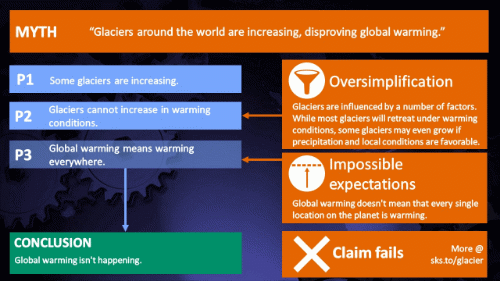 Arguments
Arguments
 Software
Software
 Resources
Comments
Resources
Comments
 The Consensus Project
The Consensus Project
 Translations
Translations
 About
Support
About
Support


Latest Posts
- 2026 SkS Weekly Climate Change & Global Warming News Roundup #06
- Skeptical Science New Research for Week #6 2026
- The future of NCAR remains highly uncertain
- Fact brief - Can solar projects improve biodiversity?
- How the polar vortex and warm ocean intensified a major US winter storm
- 2026 SkS Weekly Climate Change & Global Warming News Roundup #05
- Help needed to get translations prepared for our website relaunch!
- Skeptical Science New Research for Week #5 2026
- Climate Variability Emerges as Both Risk and Opportunity for the Global Energy Transition
- Fact brief - Are solar projects hurting farmers and rural communities?
- Winter 2025-26 (finally) hits the U.S. with a vengeance
- 2026 SkS Weekly Climate Change & Global Warming News Roundup #04
- Skeptical Science New Research for Week #4 2026
- WMO confirms 2025 was one of warmest years on record
- Fact brief - Do solar panels release more emissions than burning fossil fuels?
- Keep it in the ground?
- 2026 SkS Weekly Climate Change & Global Warming News Roundup #03
- Skeptical Science New Research for Week #3 2026
- Climate Adam - Will 2026 Be The Hottest Year Ever Recorded?
- Fact brief - Does clearing trees for solar panels release more CO2 than the solar panels would prevent?
- Where things stand on climate change in 2026
- 2026 SkS Weekly Climate Change & Global Warming News Roundup #02
- Skeptical Science New Research for Week #2 2026
- UK renewables enjoy record year in 2025 – but gas power still rises
- Six climate stories that inspired us in 2025
- How to steer EVs towards the road of ‘mass adoption’
- 2026 SkS Weekly Climate Change & Global Warming News Roundup #01
- Skeptical Science New Research for Week #1 2026
- 2025 in review - busy in the boiler room
- Direct Air Capture
Myth Deconstruction - Glacier (EN)

Reference
Deconstructing climate misinformation to identify reasoning errors
Cook, J., Ellerton, P., & Kinkead, D. (2018). Deconstructing climate misinformation to identify reasoning errors. Environmental Research Letters, 13(2), 024018. Link to PDF & Link to Supplement
Step-by-step deconstruction
The table below is inspired by the simplified supplement and may differ slightly from what is shown in the GIF. This is mostly due to make the text fit into the available space which made it necessary to reword some of it.
| 1 | Identify claim | Glaciers around the world are increasing, disproving global warming. |
| 2 | Argument structure | Premise 1: Some glaciers are increasing. Premise 2: Glaciers cannot increase in warming conditions. Conclusion: Global warming isn't happening. |
| 3 | Inferential Intent |
Deduction |
| 4 | Validity | INVALID Premises refer to local warming conditions while the conclusion is about global warming, hence the premise does not lead to the conclusion. |
| 4a | Hidden premises | Premise 1: Some glaciers are increasing. Premise 2: Glaciers cannot increase in warming conditions. Premise 3: Global warming means warming everywhere. Conclusion: Global warming isn't happening. |
| 5 | Check premises | Premise 1 is true. Premise 2 is false: oversimplification. Glacier change is based on a number of factors such as temperature and precipitation. It is possible for local conditions to be such that increased precipitation causes glaciers to grow more than warming temperatures cause melt. Premise 3 is false. Impossible expectations. Some regions may experience cooling or no temperature change during global warming." |
| 6 | Status of claim | FALSE The argument is made valid with an extra premise but contains two false premises. |
| 7 | Summary of fallacies | Oversimplification: Glaciers are influenced by a number of factors, predominantly temperature and precipitation. While most glaciers will retreat under warming conditions, some glaciers may even grow if precipitation and local conditions are favorable. Nevertheless. overall, glaciers across the globe are shrinking at an accelerating rate, threatening water supplies for millions of people. Impossible expectations: Global warming doesn't mean that every single location on the planet is warming. |
Related material
Are glaciers growing or retreating?
Blog post with background information about the myth deconstructions: Myth deconstructions as animated gifs
To learn more about the fallacies used in the myth deconstructions: A history of FLICC: the 5 techniques of science denial
Other versions
Printable Version | Back to Graphics by Skeptical Science
|
|
Skeptical Science Graphics by Skeptical Science is licensed under a Creative Commons Attribution 4.0 International License. |
THE ESCALATOR

(free to republish)
























































